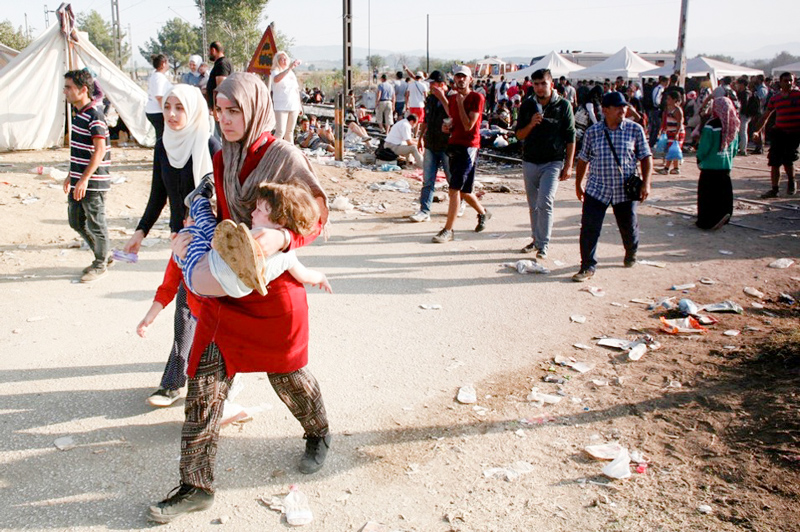
COLUMBIA—A man who left behind his home, job and memories to flee a war-torn section of Iraq and carry his family to safety came up to Cullen Larson in the country’s Kurdish region earlier this year.
He thanked Larson for the work being done in the Middle East by the agency he represents, Catholic Relief Services, and then he uttered a simple plea: “Please don’t forget us.”
Larson, regional director for CRS in the Southeast, remembered those words and is now spending most of his time trying to make sure that man, his family, and thousands of others like them are not forgotten by the faithful in the United States.
He visited parishioners at St. Peter Church and students at St. Peter School in Columbia on Oct. 25-26 to talk about the refugee crisis that is gripping Europe. He also described ways people here can help.
Wars, civil unrest and economic conditions in the Middle East, Asia and Africa have led many to migrate to Europe over the years, but numbers in recent months have skyrocketed. European Union officials currently estimate that more than 350,000 have arrived since January.

Students from St. Peter School in Columbia pray for refugees worldwide during an Oct. 26 discussion with representatives from Catholic Relief Services.
Many fleeing war torn Syria are making perilous journeys to Greece, Eastern Europe and the Balkans. So far in 2015, more than 2,000 Syrians alone have drowned in the Mediterranean trying to make it to Europe, according to statistics compiled by CRS.
In some cases, such as in Hungary, governments have put up fences to prevent the people from continuing their journeys, and other countries have prevented them from entering.
Pope Francis has called on people throughout Europe to help the displaced, urging every parish, religious community, monastery and sanctuary to take in one refugee family. Some nations, especially Germany, have welcomed the refugees but now are wondering how they will deal with the seemingly nonstop influx of people in need.
Here in the U.S., the Migration and Refugees Services of the United States Conference of Catholic Bishops has petitioned Congress and the White House to admit 100,000 refugees fleeing the Syrian conflict during fiscal year 2016 and an additional 100,000 refugees from other nations.
Larson said people on the move worldwide fall into three categories. Migrants are those who have left their country because of poverty and are seeking work elsewhere. Refugees leave their nations of origin because of violence, and internally displaced people are refugees inside their own country, forced to move from one region to another because of violence or persecution.
CRS assists all three types, but refugees fleeing Syria and Afghanistan and displaced people in Iraq represent some of the most acute needs right now, he said.
Larson said efforts to raise awareness of the refugees’ plight sometimes are thwarted by misinformation.
“People are trying to distort who these people are, to muddy the waters of reality,” he said. “These are people like you and me who are making this journey. Men and women, families with children, the elderly. They travel mostly on foot, sometimes by truck or train. They are exhausted by their trip and they just want to make it to safety.”
While the majority of refugees from the Middle East are Muslim, he said some are Christian or belong to religious minorities like the Yazidis of northwestern Iraq, who are fleeing persecution by the Islamic State.
Larson said CRS estimates that since 2011, they have assisted more than 800,000 refugees from Syria, Iraq and other nations who have settled in Lebanon, Jordan, Egypt, Turkey and northern Iraq. Refugee facilities in those countries are now almost overwhelmed, he said.
Currently the agency is working to fill the needs of the people who have made it to Greece and Balkan nations such as Albania, Macedonia and Serbia.
Many of them are on their way to what they hope will be eventual resettlement in Germany, Scandinavia and possibly parts of the United Kingdom, and CRS is also doing groundwork to help serve the refugees as they make the move north, Larson said. One of their main efforts is outreach to Caritas Germany, a Catholic agency that is working to resettle refugees there.
Larson said CRS is providing medical care, translation services, emergency food, water, and staples such as hygiene products and sleeping bags to refugees in Europe. The agency also works with Caritas and other organizations to offer temporary shelter when possible.
In northern Iraq, CRS is giving out kits that help families weatherize previously abandoned homes to provide protection from the cold. In some places, he said up to six families occupy one house, with seven people to a room.
In parts of the Middle East, Larson said workers are also trying to help refugee children whose lives and education have been disrupted by building temporary structures that serve as field classrooms or simple play areas.
St. Rafka Maronite Catholic Church in Greer has many members of Middle Eastern descent, including one Iraqi family who joined after fleeing persecution there six years ago. The parish has been contributing to help Catholic dioceses in the Middle East struggling with persecution and other issues. Members also hope to help a Middle Eastern Christian family resettle in Greenville.
Read the story of a refugee family in the next edition of The Miscellany.

